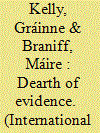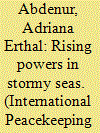|
|
|
Sort Order |
|
|
|
Items / Page
|
|
|
|
|
|
|
| Srl | Item |
| 1 |
ID:
145023


|
|
|
|
|
| Summary/Abstract |
Addressing the estrangement of distinct identity groups as a result of violent conflict is a challenging and persistent socio-psychological peacebuilding imperative. In the immediacy of a peace agreement, priority is given to pressing security and institutional arrangements, particularly within the context of substantial external intervention. Northern Ireland represents an interesting case study, as early and targeted attention was paid to the divisions between the two main communities in the region. And yet, despite substantial economic investment, the detail of how interventions aimed at addressing poor relations have been informed, designed and achieved has not been readily accessible. Focusing on grassroots-based relational and reconciliation processes, this article contends that the failure to document, analyse and adequately disseminate these approaches has resulted in community-level peacebuilding which is unnecessarily extemporary, and the focus on delivery has militated against cultures of learning, reflexivity and generosity in the sharing of good practice.
|
|
|
|
|
|
|
|
|
|
|
|
|
|
|
|
| 2 |
ID:
145024


|
|
|
|
|
| Summary/Abstract |
How are UN peacekeepers recruited? While we know a lot about UN member states’ general predispositions to participate in UN peacekeeping operations, we know very little about the actual UN force generation process. What role do the UN and its powerful member states play in this process? How do they interact to recruit UN forces? This article seeks answers to these questions by means of an in-depth case study of the force generation process for the UN–AU operation to Darfur (UNAMID). The case study relies on over 50 interviews with high-level decision-makers as well as newly declassified documents from the National Security Archive in Washington, DC. Overall the case study depicts a tantalizing division of labour between the technical expertise of the United Nations and the political power of key UN member states. It appears that UN peacekeeping contributions sometimes require the provision of financial and/or other incentives that go beyond regular UN reimbursements. As a result, powerful UN member states need to step in. However, UN officials play an important brokerage role in this process informing interested UN member states which countries would be suitable for bilateral démarches and why.
|
|
|
|
|
|
|
|
|
|
|
|
|
|
|
|
| 3 |
ID:
145020


|
|
|
|
|
| Summary/Abstract |
Reviewing findings from the recent institutional turn in peacebuilding research, this article identifies two conflicting arguments with respect to institutional designs that affect the performance of peace operations. One perspective favours functional decentralization and mission latitude, while the other perspective argues that a lack of political guidance strips mission leadership of their authority vis-à-vis local power brokers and reduces the likelihood of a ‘robust’ approach. Comparing two EU crisis management missions in Kosovo and Afghanistan, the article asks which of the two perspectives is supported by the institutional design and performance of EU peace operations. Unlike the UN – the focus of most previous research – the EU’s institutional framework is highly centralized. This provided member states with ample opportunities for political guidance, but such guidance was, in fact, negatively associated with performance. This finding suggests that the political guidance thesis must be treated with caution. Because member states’ interests vis-à-vis a conflict state rarely converge, the conditions for meaningful political guidance are absent. The article, therefore, finds that increasing managerial latitude provides the more promising avenue to enhancing peacebuilding performance. Addressing policy-makers, my findings speak to the urgent need for the EU to review and potentially reform its crisis management system.
|
|
|
|
|
|
|
|
|
|
|
|
|
|
|
|
| 4 |
ID:
145025


|
|
|
| 5 |
ID:
145021


|
|
|
|
|
| Summary/Abstract |
In February 2011, after five years of NATO powers rotating at the helm of UNIFIL's Maritime Task Force, its command was handed over to Brazil. What factors have motivated Brazil's participation, especially in light of the geographic distances separating Brazil and Lebanon and deepening crisis in Brazil? This article analyses Brazil's engagement with UNIFIL in light of key foreign policy and defence priorities and identifies three key motivations: the aspiration to participate more directly in Middle East security issues; the historical and political ties between Brazil and Lebanon; and the chance to expand Brazil's naval capacity in accordance with its new naval defence strategy within the South Atlantic. More recently, however, economic slowdown and political turbulence domestically have created new challenges for Brazil's ability to maintain its contributions to UN peacekeeping. These shifts offer an opportunity to refine the use of the ‘rising powers’ concept in the study of international security.
|
|
|
|
|
|
|
|
|
|
|
|
|
|
|
|
| 6 |
ID:
145022


|
|
|
|
|
| Summary/Abstract |
It is commonly accepted that peace operations produce public goods. Informed by theories of collective action, the article tests the claim that middle powers were free-riders in NATO’s peace operations in the Balkans (IFOR, SFOR, KFOR) from 1995–2001. In so doing, we charge that calculating the level of defence spending as a share of a country’s GDP, which has become the standard index in the literature, is limiting. We suggest that the active military-duty force share index is a better index to use, and find that middle powers did not free-ride in NATO’s peace operations in the 1990s. Quite to the contrary: they contributed more to NATO’s public good of peacekeeping than countries like France or Germany, and more than expected based on their economic abilities measured in GDP. The article then asks what could be inferred from this analysis, and offers theoretical and methodological points of critique before suggesting new avenues for future research in this vibrant research programme.
|
|
|
|
|
|
|
|
|
|
|
|
|
|
|
|
|
|
|
|
|